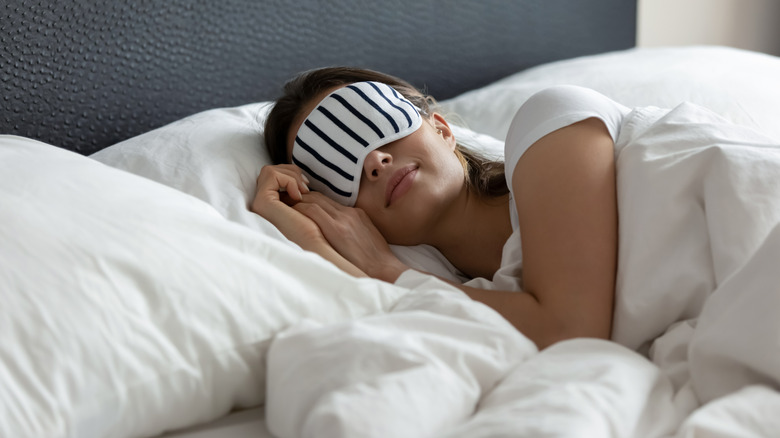Going To Bed At This Time Can Improve Your Health In Major Ways
Life can get so busy that your sleep can become secondary importance in the day-to-day scheme of things. You may not even have a set bedtime due to obligations each evening that include your children's activities or even late-day meetings on Zoom. While you may be finished with all you have to do by 8 p.m. or 9 p.m., you also want that down time to read a book, surf social media on your phone, or binge watch a few episodes of a series. Eventually, you'll decide it's time for bed, but are you choosing the right time for sleep?
Good sleep habits can promote good life habits. According to Healthline, healthy sleep leads to better concentration when you are awake, improved productivity, and better athletic performance. In contrast, poor sleep habits can lead to weight gain, a risk of type 2 diabetes, depression, a weaker immune system, and even heart disease. Now, researchers have found that going to bed at the right time can lead to better heart health and overall health in general.
An illuminating sleep study sheds light on our body clock
Researchers in Great Britain decided to find out when the optimum bedtime is by attaching wrist monitors to about 88,000 people between 2006 and 2010 and keeping track of their sleep habits, as well as their risk for heart disease. They came to one major conclusion — going to bed between 10 p.m. and 11 p.m. each night is the perfect bedtime to help your heart stay healthy, according to the newly-released study in the European Heart Journal.
"We can't help what we've evolved to be. We've evolved to be daytime creatures ... that don't live at night," David Plans, the study's author and head of research at the British health technology company, Huma, told The Washington Post. "The circadian clock has a much stronger influence on overall health than we thought."
Plans also suggested that those who can't get to bed at that magical hour due to work or other obligations can still do their body good by exposing their body and eyes to a "full spectrum of light" each morning to help regulate the body clock.
Does poor sleep impact women more than men?
Of the more than 88,000 people in the four-year British study, 58% of them were female and researchers made an unexpected discovery — the risk of heart disease may be more pronounced in women not sleeping at the right time than men. David Plans told The Washington Post that the heart disease, sleep, and female connection was a "surprising finding," but that more research was needed in that area.
While surprising to researchers regarding this specific sleep study, the link between females and heart disease is not new. According to the Centers for Disease Control and Prevention (CDC) in the United States, heart disease is the leading cause of death for American women, accounting for about one in five female deaths in 2017.
In general, the study found that there was a 25% higher risk of heart disease for people who made their bedtime at midnight or later compared to those who fell asleep between the hours of 10 p.m. and 11 p.m. There was a 24% higher risk for people who tucked themselves in relatively early, meaning before 10 p.m. (via The Washington Post).


